成都2017-2018学年高二下学期6月月考试卷 英语含答案
- 格式:docx
- 大小:74.01 KB
- 文档页数:14
![[精品]四川省成都外国语学校2017-2018学年高二英语下学期6月月考试题(含解析)](https://uimg.taocdn.com/8f3023ab700abb68a982fb8f.webp)
四川省成都外国语学校2017-2018学年高二英语下学期6月月考试题(含解析)注意事项:1.答卷前,考生务必将自己的姓名、准考证号填写在答题卡上。
3.回答选择题时,选出每小题答案后,用铅笔把答题卡上对应题目的答案标号涂黑。
如需改动,用橡皮擦干净后,再选涂其他答案标号。
回答非选择题时,将答案写在答题卡上,写在本试卷上无效。
第一部分听力(共两节,满分30分)做题时,先将答案标在试卷上,录音结束后,你将有两分钟的时间将试卷上的答案转涂到答题卡上。
第一节(共5小题,每小题1.5分,满分7.5分)听下面5段对话,每段对话后有一个小题,从题中所给的A、B、C三个选项中选出最佳答案。
听完每段对话后,你都有10秒钟的时间来回答有关小题和阅读下一小题。
每段对话仅读一遍。
例:How much is the shirt?A.£ 19.15.B.£9.18.C.£9.15.答案是C。
1. 音频What is the weather like today?A. Cool.B. Warm.C. Hot.【答案】B【解析】此题为听力题,解析略。
2. 音频What does the man want?A. A one-dollar bill.B. Some coins.C. A parking place.【答案】B【解析】此题为听力题,解析略。
3. 音频What are the speakers discussing?A. Whether to hire more workers.B. How to improve production.C. When to put the new orders.【答案】A【解析】此题为听力题,解析略。
4. 音频Where are the speakers?A. In a park.B. In a lift.C. On a bus.【答案】C【解析】此题为听力题,解析略。
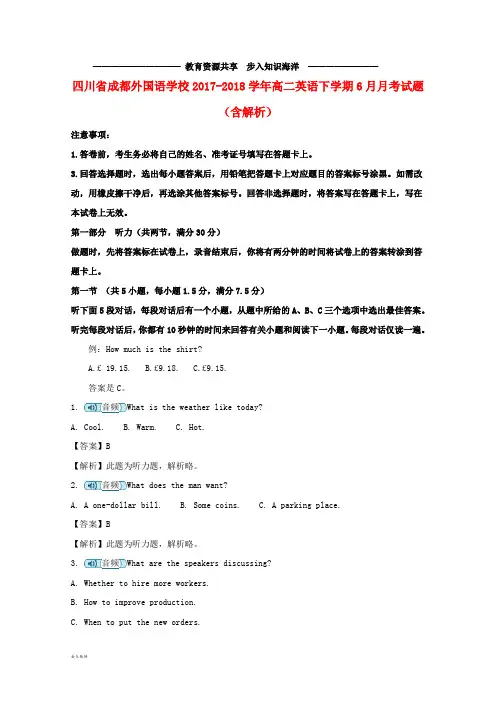
——————————教育资源共享步入知识海洋————————四川省成都外国语学校2017-2018学年高二英语下学期6月月考试题(含解析)注意事项:1.答卷前,考生务必将自己的姓名、准考证号填写在答题卡上。
3.回答选择题时,选出每小题答案后,用铅笔把答题卡上对应题目的答案标号涂黑。
如需改动,用橡皮擦干净后,再选涂其他答案标号。
回答非选择题时,将答案写在答题卡上,写在本试卷上无效。
第一部分听力(共两节,满分30分)做题时,先将答案标在试卷上,录音结束后,你将有两分钟的时间将试卷上的答案转涂到答题卡上。
第一节(共5小题,每小题1.5分,满分7.5分)听下面5段对话,每段对话后有一个小题,从题中所给的A、B、C三个选项中选出最佳答案。
听完每段对话后,你都有10秒钟的时间来回答有关小题和阅读下一小题。
每段对话仅读一遍。
例:How much is the shirt?A.£ 19.15.B.£9.18.C.£9.15.答案是C。
1. 音频What is the weather like today?A. Cool.B. Warm.C. Hot.【答案】B【解析】此题为听力题,解析略。
2. 音频What does the man want?A. A one-dollar bill.B. Some coins.C. A parking place.【答案】B【解析】此题为听力题,解析略。
3. 音频What are the speakers discussing?A. Whether to hire more workers.B. How to improve production.C. When to put the new orders.【答案】A【解析】此题为听力题,解析略。
4. 音频Where are the speakers?A. In a park.B. In a lift.C. On a bus.【答案】C【解析】此题为听力题,解析略。
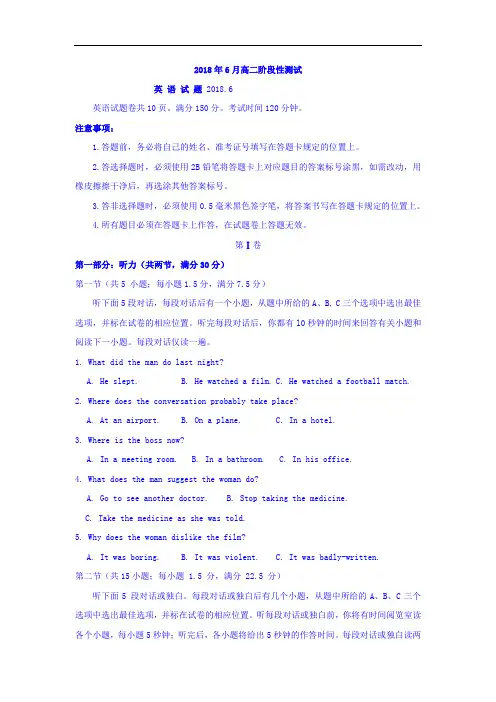
2018年6月高二阶段性测试英语试题2018.6英语试题卷共10页。
满分150分。
考试时间120分钟。
注意事项:1.答题前,务必将自己的姓名、准考证号填写在答题卡规定的位置上。
2.答选择题时,必须使用2B铅笔将答题卡上对应题目的答案标号涂黑,如需改动,用橡皮擦擦干净后,再选涂其他答案标号。
3.答非选择题时,必须使用0.5毫米黑色签字笔,将答案书写在答题卡规定的位置上。
4.所有题目必须在答题卡上作答,在试题卷上答题无效。
第Ⅰ卷第一部分:听力(共两节,满分30分)第一节(共5 小题;每小题1.5分,满分7.5分)听下面5段对话,每段对话后有一个小题,从题中所给的A、B, C三个选项中选出最佳选项,并标在试卷的相应位置。
听完每段对话后,你都有l0秒钟的时间来回答有关小题和阅读下一小题。
每段对话仅读一遍。
1. What did the man do last night?A. He slept.B. He watched a film.C. He watched a football match.2. Where does the conversation probably take place?A. At an airport.B. On a plane.C. In a hotel.3. Where is the boss now?A. In a meeting room.B. In a bathroom.C. In his office.4. What does the man suggest the woman do?A. Go to see another doctor.B. Stop taking the medicine.C. Take the medicine as she was told.5. Why does the woman dislike the film?A. It was boring.B. It was violent.C. It was badly-written.第二节(共15小题;每小题 1.5 分,满分 22.5 分)听下面5 段对话或独白。
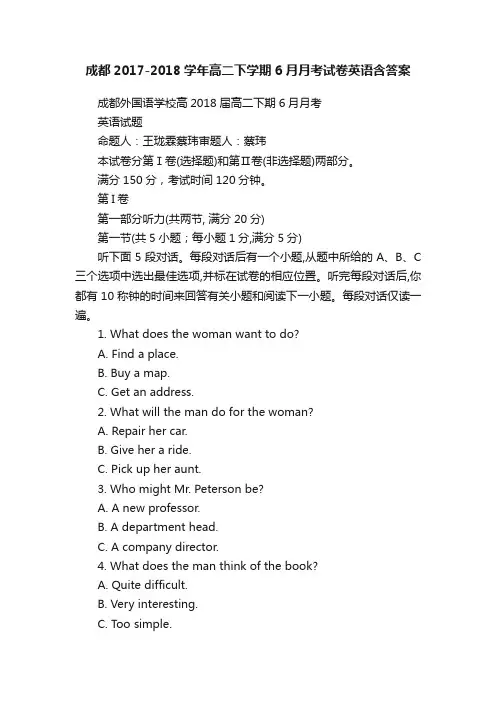
成都2017-2018学年高二下学期6月月考试卷英语含答案成都外国语学校高2018届高二下期6月月考英语试题命题人:王珑霖蔡玮审题人:蔡玮本试卷分第Ⅰ卷(选择题)和第Ⅱ卷(非选择题)两部分。
满分150分,考试时间120分钟。
第I卷第一部分听力(共两节, 满分20分)第一节(共5小题;每小题1分,满分5分)听下面5段对话。
每段对话后有一个小题,从题中所给的A、B、C 三个选项中选出最佳选项,并标在试卷的相应位置。
听完每段对话后,你都有10称钟的时间来回答有关小题和阅读下一小题。
每段对话仅读一遍。
1. What does the woman want to do?A. Find a place.B. Buy a map.C. Get an address.2. What will the man do for the woman?A. Repair her car.B. Give her a ride.C. Pick up her aunt.3. Who might Mr. Peterson be?A. A new professor.B. A department head.C. A company director.4. What does the man think of the book?A. Quite difficult.B. Very interesting.C. Too simple.5. What are the speakers talking about?A. Weather.B. Clothes.C. News.第二节(共15小题;每小题1分,满分15分)听下面5段对话或独白。
每段对话或独白后有几个小题,从题中所给的A、B、C三个选项中选出最佳选项,并标在试卷的相应位置。
听每段对话或独白前,你将有时间阅读各个小题,每小题5秒钟;听完后,各小题给出5秒钟的作答时间。
每段对话或独白读两遍。
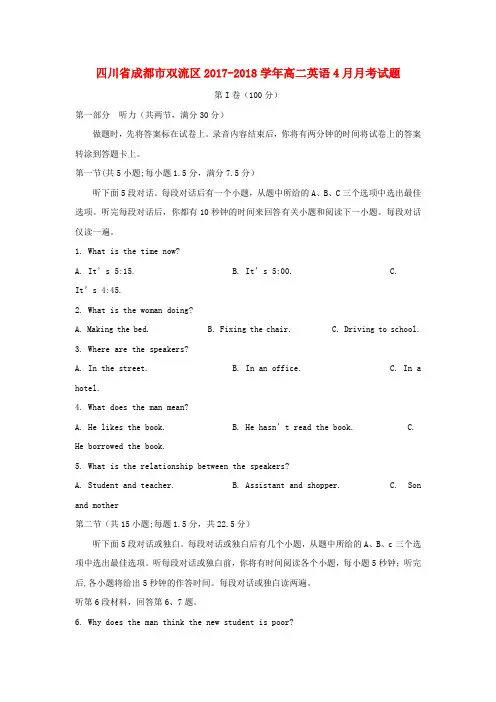
四川省成都市双流区2017-2018学年高二英语4月月考试题第I卷(100分)第一部分听力(共两节,满分30分)做题时,先将答案标在试卷上。
录音内容结束后,你将有两分钟的时间将试卷上的答案转涂到答题卡上。
第一节(共5小题;每小题1.5分,满分7.5分)听下面5段对话。
每段对话后有一个小题,从题中所给的A、B、C三个选项中选出最佳选项。
听完每段对话后,你都有10秒钟的时间来回答有关小题和阅读下一小题。
每段对话仅读一遍。
1. What is the time now?A. It’s 5:15.B. It’s 5:00.C.It’s 4:45.2. What is the woman doing?A. Making the bed.B. Fixing the chair.C. Driving to school.3. Where are the speakers?A. In the street.B. In an office.C. In a hotel.4. What does the man mean?A. He likes the book.B. He hasn’t read the book.C. He borrowed the book.5. What is the relationship between the speakers?A. Student and teacher.B. Assistant and shopper.C. Son and mother第二节(共15小题;每题1.5分,共22.5分)听下面5段对话或独白。
每段对话或独白后有几个小题,从题中所给的A、B、c三个选项中选出最佳选项。
听每段对话或独白前,你将有时间阅读各个小题,每小题5秒钟;听完后,各小题将给出5秒钟的作答时间。
每段对话或独白读两遍。
听第6段材料,回答第6、7题。
6. Why does the man think the new student is poor?A. She only wears jeans.B. There’re holes in her jeans.C. Her clothes are worn out.7. How does the woman feel about the man?A. He is a little slow.B. His idea is out of date.C. He should help others.听第7段材料,回答第8至10题。
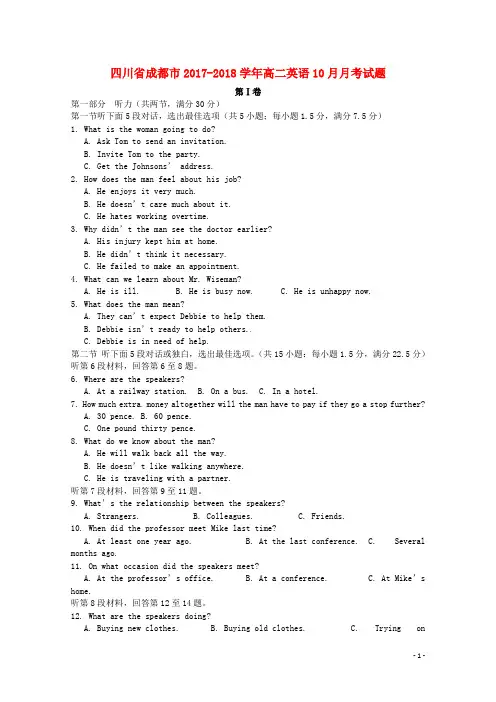
四川省成都市2017-2018学年高二英语10月月考试题第Ⅰ卷第一部分听力(共两节,满分30分)第一节听下面5段对话,选出最佳选项(共5小题;每小题1.5分,满分7.5分)1. What is the woman going to do?A. Ask Tom to send an invitation.B. Invite Tom to the party.C. Get the Johnsons’ address.2. How does the man feel about his job?A. He enjoys it very much.B. He doesn’t care much about it.C. He hates working overtime.3. Why didn’t the man see the doctor earlier?A. His injury kept him at home.B. He didn’t think it necessary.C. He failed to make an appointment.4. What can we learn about Mr. Wiseman?A. He is ill.B. He is busy now.C. He is unhappy now.5. What does the man mean?A. They can’t expect Debbie to help them.B. Debbie isn’t ready to help others.C. Debbie is in need of help.第二节听下面5段对话或独白,选出最佳选项。
(共15小题:每小题1.5分,满分22.5分)听第6段材料,回答第6至8题。
6. Where are the speakers?A. At a railway station.B. On a bus.C. In a hotel.7. How much extra money altogether will the man have to pay if they go a stop further?A. 30 pence.B. 60 pence.C. One pound thirty pence.8. What do we know about the man?A. He will walk back all the way.B. He doesn’t like walking anywhere.C. He is traveling with a partner.听第7段材料,回答第9至11题。
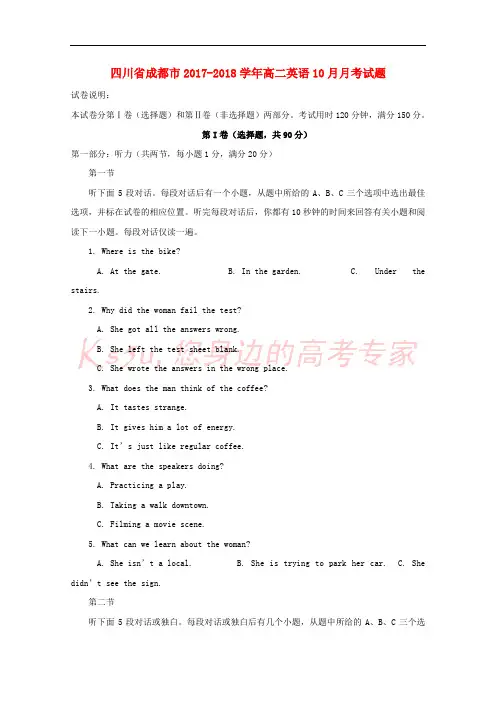
四川省成都市2017-2018学年高二英语10月月考试题试卷说明:本试卷分第Ⅰ卷(选择题)和第Ⅱ卷(非选择题)两部分。
考试用时120分钟,满分150分。
第I卷(选择题,共90分)第一部分:听力(共两节,每小题1分,满分20分)第一节听下面5段对话。
每段对话后有一个小题,从题中所给的A、B、C三个选项中选出最佳选项,并标在试卷的相应位置。
听完每段对话后,你都有10秒钟的时间来回答有关小题和阅读下一小题。
每段对话仅读一遍。
1. Where is the bike?A. At the gate.B. In the garden.C. Under the stairs.2. Why did the woman fail the test?A. She got all the answers wrong.B. She left the test sheet blank.C. She wrote the answers in the wrong place.3. What does the man think of the coffee?A. It tastes strange.B. It gives him a lot of energy.C. It’s just like regular coffee.4. What are the speakers doing?A. Practicing a play.B. Taking a walk downtown.C. Filming a movie scene.5. What can we learn about the woman?A. She isn’t a local.B. She is trying to park her car.C. She didn’t see the sign.第二节听下面5段对话或独白。
每段对话或独白后有几个小题,从题中所给的A、B、C三个选项中选出最佳选项,并标在试卷的相应位置。
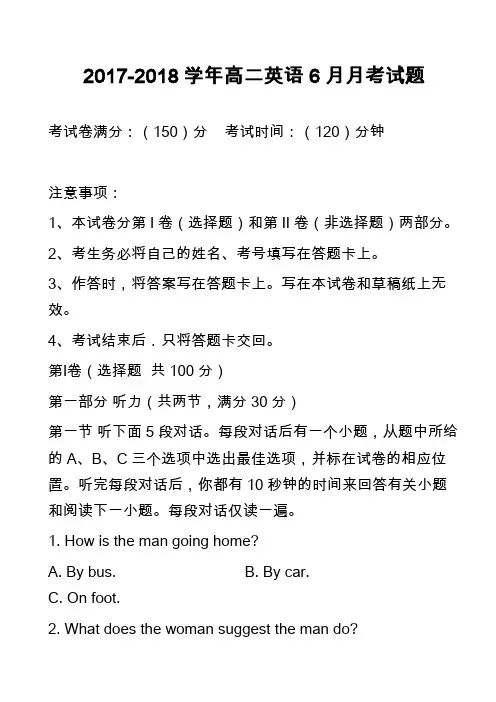
2017-2018学年高二英语6月月考试题考试卷满分:(150)分考试时间:(120)分钟注意事项:1、本试卷分第I卷(选择题)和第II卷(非选择题)两部分。
2、考生务必将自己的姓名、考号填写在答题卡上。
3、作答时,将答案写在答题卡上。
写在本试卷和草稿纸上无效。
4、考试结束后.只将答题卡交回。
第Ⅰ卷(选择题共100分)第一部分听力(共两节,满分30分)第一节听下面5段对话。
每段对话后有一个小题,从题中所给的A、B、C三个选项中选出最佳选项,并标在试卷的相应位置。
听完每段对话后,你都有10秒钟的时间来回答有关小题和阅读下一小题。
每段对话仅读一遍。
1. How is the man going home?A. By bus.B. By car.C. On foot.2. What does the woman suggest the man do?A. Go to the opening.B. Have a good rest.C. I nvite Rick to the ice festival.3. When will the man meet Dave?A. On Thursday.B. On Friday.C. On S aturday.4. What are the speakers mainly talking about?A. Their friend Tom.B. A notice.C. A manager .5. What does the woman imply?A. They should move to another city.B. The air quality is not so serious as the man says.C. The air pollution is caused by the development of industry.第二节听下面5段对话或独白。
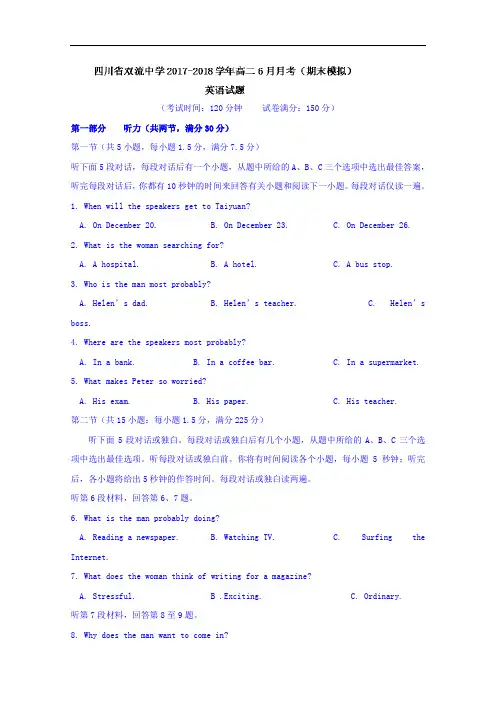
(考试时间:120分钟试卷满分:150分)第一部分听力(共两节,满分30分)第一节(共5小题,每小题1.5分,满分7.5分)听下面5段对话,每段对话后有一个小题,从题中所给的A、B、C三个选项中选出最佳答案,听完每段对话后,你都有10秒钟的时间来回答有关小题和阅读下一小题。
每段对话仅读一遍。
1. When will the speakers get to Taiyuan?A. On December 20.B. On December 23.C. On December 26.2. What is the woman searching for?A. A hospital.B. A hotel.C. A bus stop.3. Who is the man most probably?A. Helen’s dad.B. Helen’s teacher.C. Helen’s boss.4. Where are the speakers most probably?A. In a bank.B. In a coffee bar.C. In a supermarket.5. What makes Peter so worried?A. His exam.B. His paper.C. His teacher.第二节(共15小题:每小题1.5分,满分225分)听下面5段对话或独白。
每段对话或独白后有几个小题,从题中所给的A、B、C三个选项中选出最佳选项。
听每段对话或独白前。
你将有时间阅读各个小题,每小题5秒钟;听完后,各小题将给出5秒钟的作答时间。
每段对话或独白读两遍。
听第6段材料,回答第6、7题。
6. What is the man probably doing?A. Reading a newspaper.B. Watching TV.C. Surfing the Internet.7. What does the woman think of writing for a magazine?A. Stressful. B .Exciting. C. Ordinary.听第7段材料,回答第8至9题。
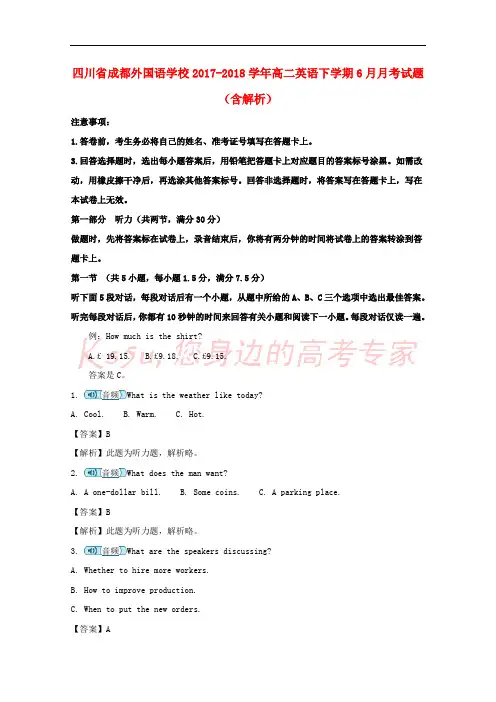
四川省成都外国语学校2017-2018学年高二英语下学期6月月考试题(含解析)注意事项:1.答卷前,考生务必将自己的姓名、准考证号填写在答题卡上。
3.回答选择题时,选出每小题答案后,用铅笔把答题卡上对应题目的答案标号涂黑。
如需改动,用橡皮擦干净后,再选涂其他答案标号。
回答非选择题时,将答案写在答题卡上,写在本试卷上无效。
第一部分听力(共两节,满分30分)做题时,先将答案标在试卷上,录音结束后,你将有两分钟的时间将试卷上的答案转涂到答题卡上。
第一节(共5小题,每小题1.5分,满分7.5分)听下面5段对话,每段对话后有一个小题,从题中所给的A、B、C三个选项中选出最佳答案。
听完每段对话后,你都有10秒钟的时间来回答有关小题和阅读下一小题。
每段对话仅读一遍。
例:How much is the shirt?A.£ 19.15.B.£9.18.C.£9.15.答案是C。
1. 音频What is the weather like today?A. Cool.B. Warm.C. Hot.【答案】B【解析】此题为听力题,解析略。
2. 音频What does the man want?A. A one-dollar bill.B. Some coins.C. A parking place.【答案】B【解析】此题为听力题,解析略。
3. 音频What are the speakers discussing?A. Whether to hire more workers.B. How to improve production.C. When to put the new orders.【答案】A【解析】此题为听力题,解析略。
4. 音频Where are the speakers?A. In a park.B. In a lift.C. On a bus.【答案】C【解析】此题为听力题,解析略。
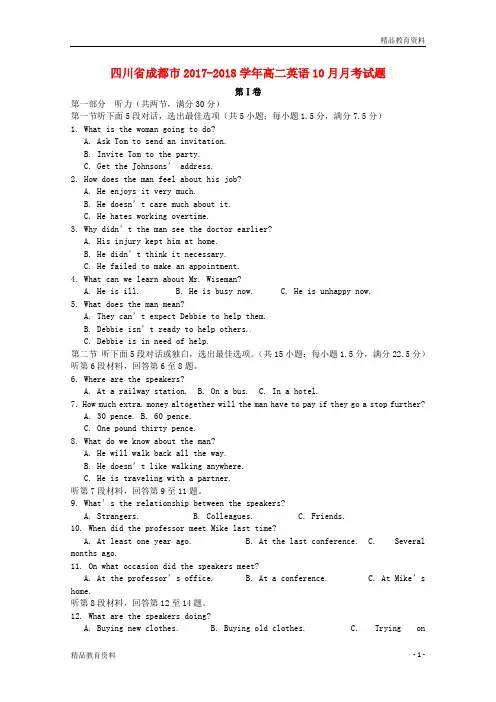
四川省成都市2017-2018学年高二英语10月月考试题第Ⅰ卷第一部分听力(共两节,满分30分)第一节听下面5段对话,选出最佳选项(共5小题;每小题1.5分,满分7.5分)1. What is the woman going to do?A. Ask Tom to send an invitation.B. Invite Tom to the party.C. Get the Johnsons’ address.2. How does the man feel about his job?A. He enjoys it very much.B. He doesn’t care much about it.C. He hates working overtime.3. Why didn’t the man see the doctor earlier?A. His injury kept him at home.B. He didn’t think it necessary.C. He failed to make an appointment.4. What can we learn about Mr. Wiseman?A. He is ill.B. He is busy now.C. He is unhappy now.5. What does the man mean?A. They can’t expect Debbie to help them.B. Debbie isn’t ready to help others.C. Debbie is in need of help.第二节听下面5段对话或独白,选出最佳选项。
(共15小题:每小题1.5分,满分22.5分)听第6段材料,回答第6至8题。
6. Where are the speakers?A. At a railway station.B. On a bus.C. In a hotel.7. How much extra money altogether will the man have to pay if they go a stop further?A. 30 pence.B. 60 pence.C. One pound thirty pence.8. What do we know about the man?A. He will walk back all the way.B. He doesn’t like walking anywhere.C. He is traveling with a partner.听第7段材料,回答第9至11题。
1.答卷前,考生务必将自己的姓名、准考证号填写在答题卡上。
3.回答选择题时,选出每小题答案后,用铅笔把答题卡上对应题目的答案标号涂黑。
如需改动,用橡皮擦干净后,再选涂其他答案标号。
回答非选择题时,将答案写在答题卡上,写在本试卷上无效。
第一部分听力(共两节,满分30分)做题时,先将答案标在试卷上,录音结束后,你将有两分钟的时间将试卷上的答案转涂到答题卡上。
第一节(共5小题,每小题1.5分,满分7.5分)听下面5段对话,每段对话后有一个小题,从题中所给的A、B、C三个选项中选出最佳答案。
听完每段对话后,你都有10秒钟的时间来回答有关小题和阅读下一小题。
每段对话仅读一遍。
例:How much is the shirt?A.£ 19.15.B.£9.18.C.£9.15.答案是C。
1. 音频What is the weather like today?A. Cool.B. Warm.C. Hot.【答案】B【解析】此题为听力题,解析略。
2. 音频What does the man want?A. A one-dollar bill.B. Some coins.C. A parking place.【答案】B【解析】此题为听力题,解析略。
3. 音频What are the speakers discussing?A. Whether to hire more workers.B. How to improve production.C. When to put the new orders.【答案】A【解析】此题为听力题,解析略。
4. 音频Where are the speakers?A. In a park.B. In a lift.C. On a bus.【答案】C【解析】此题为听力题,解析略。
5. 音频What has the woman done?A. She has changed her car for a new one.B. She has taken a new car for a test drive.C. She has finished recording a radio program.【答案】B..............................第二节(共15小题;每小题1.5分,满分22.5分)听下面5段对话或独白。
2017-2018学年度高二年级下学期6月英语月考试卷第一部分:听力(共两节,满分20分)第一节(共5小题;每小题1分,满分5分)听下面5段对话。
每段对话后有一个小题,从题中所给的A、B、C三个选项中选出最佳选项,并标在试卷的相应的位置。
听完每段对话后,你都有10秒钟的时间来回答有关小题和阅读下一小题。
每段对话仅读一遍。
1.What is the man wearing now?A. A jacket.B. A shirt.C. A jacket and a shirt.2. Where was the man last night?A. At home.B. In his neighbor’s house.C. In the hospital.3. When will the flight arrive?A. At 9:00.B. At 9:05.C. At 9:10.4. What do we know from the conversation?A. The man is late.B. It is 7:25 now.C. The film hasbeen on for five minutes .5. Where are the two speakers probably speaking?A. In the police station.B. On the street.C. In a shop.第二节(共15小题;每小题1分,满分15分)听下面5段对话。
每段对话后有几个小题,从题中所给的A、B、C三个选项中选出最佳选项,并标在试卷的相应位置。
听每段对话前,你将有时间阅读各小题,每小题5秒钟;听完后,各小题将给出5秒钟的作答时间。
每段对话读两遍。
听第6段材料,回答第6至第7题。
6. Why is the woman going to ?A. To have a trip.B. To go for further study.C. To take part in a Chinese contest.7. When will the woman leave?A. Tonight.B. Tomorrow morning.C. T he day after tomorrow.听第7段材料,回答第8至第9题。
6月英语月考参考答案听力:1-5CBABA6-10ACBAC11-15CBCAB16-20BCCBA阅读理解:21-23BCA24-27CBAD28-30DBBC31-35DABB七选五:36-40FEAGD完形填空:41-45BDCAC46-50BDADC51-55ABCDB56-60AADBD语篇语法填空:61.literally62.when63.the64.its65.that62.66.shared67.to\for68.origins69.have come70.remaining改错:1.find→found2.the→a3.gave→giving/give或her改为she4.neighbor→neighbors5.but→and6.去掉to7.me之前加上with8.their→them9.deep→deeply10.proud→pride参考范文:Last week witnessed the yearly Mother Tongue Festival which lasted for3days,drawing the attention from both teachers and students.The principal’s speech declared the festival open on the morning of Monday,followed by various activities last week.Ranging from displaying posters about our beautiful mother language to giving performances at the lecture hall,the festival has always been a feast for all participants. The event can not only provide students with access to acquiring more knowledge related to Chinese,but also serves as a perfect chance for us to get to know our culture better.With the festival held every year,students are equipped with better understanding of our language and stronger confidence about our unique culture.听力原文听力原文:(Text1)M:Did you go to the football game yesterday?W:No,I couldn’t make it.I was stuck in the lab.M:You missed a really good game.Our school team played very well.(Text2)W:Did you hear the weather forecast for tomorrow?Is it going to be windy?M:No,there will be high clouds in the morning,and heavy showers in the afternoon and evening. (Text3)M:Kate,let’s go for a picnic somewhere this weekend.W:Good idea.Can Jack go with us?He’s studied hard for his exam in the past two weeks.M:I don’t think so.He’s going on a trip this weekend with his school.(Text4)M:Hello,is it Emma?This is Robert Allen from Johnson’s Electronics.W:Hello,Robert,what can I do for you?M:It’s this visit by Mr.Johnson.I’m afraid he’s had an emergency and won’t be able to make it this time.(Text5)M:Have you been waiting long?W:No,just a few minutes.How was the flight?M:It was fine,thanks.I slept through the whole flight actually and I feel much better.(Text6)M:I’m starving.What are we having for dinner tonight,Jane?W:I’m not sure.Something will come to mind once I start.M:I feel like eating French Fries or maybe ham sandwich.How about you?W:Actually,I was thinking of making something healthy,say...fish and vegetables.M:Well,in that case,I’ll have whatever you make.(Text7)W:Hello,George,I’ve heard that you’re going to Milan for a business trip next week.M:Yeah,Susan,I’m also planning a trip to Rome for sightseeing after that.W:Oh,I’m just back from Rome.The city has made some new rules.M:Really?What rules?W:For example,people who dress up as Roman soldiers and charge for photos won’t be allowed near hot tourist spots,and street performers can’t sing or play loud music on public transport.Another rule bans tourists from eating in public places.M:That’s good.Eating in public is inappropriate and can lead to littering.W:Rome isn’t the only city to do st year,Florence made a rule saying that tourists could face fines of up to500euros if caught eating in the street.M:Wow,that’s big money,but it’s understandable.(Text8)W:Hi,Frank.I heard you were going to withdraw from the speech class.Can you tell me why? M:Well,Ms.McDaniel,I don’t think I can make it.Public speaking scares me.I just can’t get in front of a group and talk.W:What is that you fear about speaking in front of a group?M:I am afraid I would look silly if I forget a word or say something stupid or if I shake,turn red. W:What would happen if you did one of these things?M:People would laugh at me.W:Well,Frank,your fear is really not based on fact.I once asked my students what they would do if someone in class forgot a word or made a mistake.They said they would feel bad for the speaker for they knew they would be in the speaker’s shoes some day.Does that make you feel better?M:Yeah,I guess.W:I hope you’ll stay in the class,and try a bit more.M:Okay.Thanks,Ms.McDaniel.(Text9)M:How many applications did we get,Mary?W:Well,overall we’ve got over200.M:Wow,that many!W:Yes,but most of which we can reject right away,people who don’t have the right experience, qualifications,that kind of thing.M:Of course.W:And so,I drew up a shortlist of12candidates.M:Are we going to interview all of them?W:I think we should.But certainly,I’ll let you have a look first.M:Great,so,who have we got then?W:Well,I think we’ve got some pretty strong candidates.Two in particular.M:They have the right kind of qualification?W:I’d certainly say so.A strong educational background,experience in sales,language skills... M:Good.I look forward to meeting all of them.W:So,I’d say we do this standard interview format.M:Sure.W:A few general questions,then onto specifics.We could also ask them to give a short presentation.M:Great.I’m really looking forward to this.(Text10)W:Welcome back,everyone.This i s CBA N ews Radio.Here comes something interesting.Yesterday,a teenage girl named Terra Gallo,from Cumberland,got some unexpected news when she received a handwritten letter from a fisherman saying that her message in a bottle had been found in Spain.Gallo and her sister put messages into bottles and threw them into the ocean while visiting their aunt on Monhegan Island three years ago.The girls had forgotten about the bottles until they were surprised by the fisherman’s letter.Gallo,now 14,studied maps and discovered her message traveled about3,000miles.Gallo’s message asked that whoever found her bottle should put their own message inside with hers and send it back out to sea.The fisherman said in his letter that he had carried out her wishes.。
2017-2018学年度第二学期第二次阶段考试高二英语试题第一部分听力(共两节,满分30分)第一节(共5小题;每小题1.5分,满分7.5分)听下面5段对话。
每段对话后有一个小题,从题中所给的A、B、C三个选项中选出最佳选项,并标在试卷的相应位置。
听完每段对话后,你都有10秒钟的时间来回答有关小题和阅读下一小题。
每段对话仅读一遍。
1. What is the woman?A. A secretary.B. An air hostess.C. A waitress.2. Where does the conversation take place?A. In a library.B. In a bookstore.C. In a classroom.3. At what time should the man check in?A. 8:50.B. 9:50.C. 10:50.4. What did the woman do last night?A. She suffered a disaster.B. She visited the man.C. She went to a party.5. What does the man mean?A. He’ll watch the game with his uncle.B. He’ll definitely watch the game.C. He has no interest in the game.第二节(共15小题;每小题1.5分,满分22.5分)听下面5段对话或对白,每段对话或独白后有几个小题,从题中所给的A、B、C三个选项中选出最佳选项,并标在试卷的相应位置,听每段对话或独白前,你将有时间阅读各个小题。
每小题5秒钟;听完后,各小题给出5秒钟的作答时间。
每段对话或独白读两遍。
听第6段材料,回答第6、7题。
6. Where is the woman from?A. America.B. India.C. Russia.7. What will the woman do?A. Ask for candy door to door.B. Play the “Trick or Treat” game.C. Join in a costume party.听第7段材料,回答第8、9题。
成都外国语学校高2018届高二下期6月月考英语试题命题人:王珑霖蔡玮审题人:蔡玮本试卷分第Ⅰ卷(选择题)和第Ⅱ卷(非选择题)两部分。
满分150分,考试时间120分钟。
第I卷第一部分听力(共两节, 满分20分)第一节(共5小题;每小题1分,满分5分)听下面5段对话。
每段对话后有一个小题,从题中所给的A、B、C三个选项中选出最佳选项,并标在试卷的相应位置。
听完每段对话后,你都有10称钟的时间来回答有关小题和阅读下一小题。
每段对话仅读一遍。
1. What does the woman want to do?A. Find a place.B. Buy a map.C. Get an address.2. What will the man do for the woman?A. Repair her car.B. Give her a ride.C. Pick up her aunt.3. Who might Mr. Peterson be?A. A new professor.B. A department head.C. A company director.4. What does the man think of the book?A. Quite difficult.B. Very interesting.C. Too simple.5. What are the speakers talking about?A. Weather.B. Clothes.C. News.第二节(共15小题;每小题1分,满分15分)听下面5段对话或独白。
每段对话或独白后有几个小题,从题中所给的A、B、C三个选项中选出最佳选项,并标在试卷的相应位置。
听每段对话或独白前,你将有时间阅读各个小题,每小题5秒钟;听完后,各小题给出5秒钟的作答时间。
每段对话或独白读两遍。
听第6段材料,回答第6、7题。
6. Why is Harry unwilling to join the woman?A. He has a pain in his knee.B. He wants to watch TV.C. He is too lazy.7. What will the woman probably do next?A. Stay at home.B. Take Harry to hospital.C. Do some exercise. 听第7段材料,回答第8、9题。
8. When will the man be home from work?A. At 5:45.B. At 6:15.C. At 6:50.9. Where will the speakers go?A. The Green House Cinema.B. The New State Cinema.C. The UME Cinema.听第8段材料,回答第10至12题。
10. How will the speakers go to New York?A. By air.B. By taxi.C. By bus.11. Why are the speakers making the trip?A. For business.B. For shopping.C. For holiday.12. What is the probable relationship between the speakers?A. Driver and passenger.B. Husband and wife.C. Fellow workers.听第9段材料,回答第13至16题。
13. Where does this conversation probably take place?A. In a restaurant.B. In an office.C. In a classroom.14. What does John do now?A. He's a trainer.B. He's a tour guide.C. He's a college student.15. How much can a new person earn for the first year?A. $10,500.B. $12,000.C. $15,000.16. How many people will the woman hire?A. Four.B. Three.C. Two.听第10段材料,回答第17至20题。
17. How long has the speaker lived in a big city?A. One year.B. Ten years.C. Eighteen years.18. What is the speaker's opinion on public transport?A. It's comfortable.B. It's time-saving.C. It's cheap.19. What is good about living in a small town?A. It's safer.B. It's healthier.C. It's more convenient.20. What kind of life does the speaker seem to like most?A. Busy.B. Colourful.C. Quiet.第二部分阅读理解(共两节,满分40分)第一节 (共15小题;每小题2分,满分30分)阅读下列短文,从每题所给的四个选项(A、B、C、和D)中,选出最佳选项,并在答题卡上将该项涂黑。
AMy daughter Kelly is a cautious person. She needs to warm up to situations, is hesitant to try new things. When with close friends, she becomes a leader who laughs loudly and chants, “Girls rule, boys drool.” But when that comfort zone is not around her, she is shy and nervous.This has been challenging for me at times. “Shy” is not a word that I think has ever been used to describe me. But this has been a year of firsts for my girl that has filled her with a new sense of confidence. This year she moved to lap lane in swimming where she was preparing for a swim team. This year she learned to ride a bike without training wheels. And this year she completed her first kids’ triathlon (三项全能) .On Saturday, with a thunderstorm coming soon and my son’s birthday party later in the day, we all went out in the dark of the morning for Kelly to participate in her first triathlon. We practiced transitions from swim to bike to run with her, we got all the equipment she’d need, and we kept talking about the race. But as we waited the two hours for the older kids to finish before her turn, she held my leg a little harder and told me she loved me a few too many times. She was nervous but trying to keep it together.And then it was her turn. From the second she jumped into the water, my heart soared. My daughter transformed into the most confident human being I had ever seen. She dominated(主宰) that swim, crushed that bike ride and ran to the finish with the biggest smile on her face.I can honestly say that I never felt so proud of someone in my entire life. It wasn’t because she did a sport or anything like that. It was because she was afraid of something and conquered(克服)that fear with confidence an d a fire I hadn’t seen before.All day I would find myself just looking over at her and smiling. She might be wearing the finalist medal but I felt like I won that day. I won the chance to see my girl shine.Shine on, sweet baby.21. Kelly is nervous when ________.A. she changes into a leaderB. boys are around herC. situations are new to herD. she is away from her mom22. We can know from Paragraph 3 ______.A. the whole family gave Kelly supportB. the race began in the early morningC. Kelly was eager for her turn in the raceD. Kelly prepared for her brother’s birthday party23. Seeing Kelly’s performance in the race, the author felt ______.A. worried and hesitantB. anxious and uneasyC. curious and concernedD. excited and proud24. The author “felt like I won that day” because Kelly ______.A. expressed love to herB. overcame the fearC. took part in the sportD. won the gold medalBIn New York City public schools, 176 different languages are spoken among more than 1 million students. For 160,000 children, English is not their first language. New York's Department of Education makes learning better for these students by providing dual-language programs, in which students are taught in two languages, English and another one, like Russian or Chinese. Math, social studies, science and all other regular courses are taught in both languages. And they learn about the culture of the other country.Milady Baez, Deputy Chancellor of English Language Learners and Student Support, says these dual-language programs will help children succeed in the future. "The jobs of the future require that our students know more than one language. They are going to be traveling abroad; they are going to be communicating with people from all over the world. This will open doors for them."Middle-schoolers might not have jobs on their minds yet. For Kequing Jaing, she likes keeping up her first language, Mandarin."It makes me feel that I am home because I can speak in Chinese, learn in Chinese, while learning in English. So it makes me feel better and makes me understand more about the task I'm learning."Anastasia Hudikova came to the United States when she was 2 years old. She says the Russian-English program keeps her connected to her heritage and her parents happy."They're really happy about the program. They are really happy that I can preserve my culture and my language, and that I can speak it fluently in school."The New York schools also offer dual-language programs in seven other languages: Arabic, French, Haitian Creole, Hebrew, Korean, Polish and Spanish. There are plans to add even more languages in the future.While these dual-language programs are popular, some organizations in the U.S. say teaching English comes first. U.S. Studies show that children who learn English early will be more successful later.25. Who may not quite agree with dual-language programs?A. Milady BaezB. Kequing JaingC. Anastasia Hudikova’s parentsD. some organizations in the U.S26. Which one of the following is true according to the article?A. Most students in New York public schools are not native English speakers.B. A dual-language program is carried out to help overcome the language barrier.C. The dual-language program contributes to preserving a foreign student’s own culture.D. Seven languages are adopted in the program at present.27. The author writes the passage in order to_________.A. encourage us to learn more languagesB. introduce dual-language programs in New York schoolsC. advertise the dual-language programsD. inspire more students to study in New YorkCDoes happiness have a scent?When someone is happy, can you smell it?You can usually tell when someone is happy based on seeing them smile, hearing them laugh or perhaps from receiving a big hug. But can you also smell their happiness? Surprising new research suggests that happiness does indeed have a scent, and that the experience of happiness can be transmitted through smell, reports .For the study, 12 young men were shown videos meant to bring about a variety of emotions while researchers gathered sweat samples from them. All of the men were healthy and none of them were drug users or smokers, and all were asked to abstain from drinking or eating smelly foods during the study period.Those sweat samples were then given to 36 equally healthy young women to smell, while researchers monitored their reactions. Only women were selected to smell the samples, apparently because previous research has shown that women have a better sense of smell than men and are also more sensitive to emotional signaling—though it's unclear why only men were chosen to produce the scents.Researchers found that the behavior of the women after smelling the scents—particularly their facial expressions—indicated a relationship between the emotional states of the men who produced the sweat and the women who sniffed them.“Human sweat produced when a person is happy brings about a state similar to happiness in somebody who breathes this smell,” said study co-author Gun Semin, a professor at Koc University in Turkey.This is a fascinating finding because it not only means that happiness does have a scent, but that the scent is capable of transmitting the emotion to others. The study also found that other emotions, such as fear, seem to carry a scent too. This ensures previous research suggesting that some negative emotions have a smell, but it is the first time this has proved to be true of positive feelings.Researchers have yet to isolate(分离) exactly what the chemical compound for the happiness smell is, but you might imagine what the potential applications for such a finding could be. Happiness perfumes, for instance, could be invented. Scent therapies(香味疗法)could also be developed to help people through depression or anxiety.Perhaps the most surprising result of the study, however, is our broadened understanding of how emotions get communicated, and also how our own emotions are potentially managed through our social context and the emotional states of those around us.28. What is the main finding of the new research?A. Pleasant feelings can be smelt out.B. Negative emotions have a smell.C. Men produce more sweats.D. Women have a better sense of smell.29. The underlined part “abstain from” in Paragraph 3 probably means _________.A. tryB. avoidC. continueD. practice30. What is the application value of the new research?A. Perfumes could help people understand each other.B. Some smells could be created to improve our appearance.C. Perfumes could be produced to cure physical diseases.D. Some smells could be developed to better our mood.31. We can learn from the last paragraph that .A. happiness comes from a scent of sweatB. social surroundings can influence our emotionsC. people need more emotional communicationD. positive energy can deepen understandingDConventional wisdom is a major barrier to innovation that threatens the survival of companies everywhere. It’s based on the assumption that old ideas will always work, so they sho uldn’t be challenged. While this may be a valid assumption in situations that don’t change, it’s unlikely to hold true in a changing situation. In today’s rapid changing global environment, oldmethods often don't work, and stubbornly using them can lead to major problems.Most people seem to agree with conventional wisdom because it gives one a false sense of security. If everyone else believes it, then it must be true. Individuals who use conventional wisdom are certain that they are right, and being right is good. They want to continue using old ideas rather than take risks with changes that might not work. In 1977, Ken Olsen, co-founder and CEO of Digital Equipment Corporation (DEC), stated “There is no reason for any individual to have a computer in his home.” Despite being a dominant leader in the computer industry, DEC no longer exists.People seem to forget that since innovation is a change, there can be no innovation without change. Unfortunately, conventional wisdom prevents leaders, followers and companies from changing and therefore innovating. If companies don’t innovate, but their competitors do, the future is likely to be problematic. Breaking from conventional wisdom has led to many of the most innovative companies and products in history across many industries, so it has a powerful effect on business success.Ted Turner (founder of CNN) knew little, if anything, about the news business, but he knew it was inconvenient to watch news only at the dinner hour,as was common before CNN. Turner’s solution was to create a cable channel dedicated to news 24 hours a day. The news establishment reflected conventional wisdom at the time, and predicted his idea would fail because no one wanted to watch the news all day. However, it doesn’t take a rocket sci entist to understand that viewers don’t have to watch the news all day for the CNN to work. Viewers just have to watch when they want to get information. Due to conventional thinking, the critics failed to recognize the opportunity that was clear to Ted. They assumed that only what was familiar to them could work in the future.Conventional wisdom prevents creativity, flexibility and risk-taking, so unconventional leaders enthusiastically break from it. To survive, thrive and maintain competitive advantage, companies must be flexible when reacting to change.32. DEC has disappeared probably because ___________.A. the consumers didn’t like its productsB. the leaders lacked the sense of securityC. the CEO stuck to the conventional ideasD. the employees took many risks with changes33. The founding of CNN is used as an example to prove _________.A. missing opportunities could lead to failureB. changing could contribute to business successC. watching news at the dinner hour is convenientD. conventional wisdom influences business success34. What does the underlined part probably mean?A. Rocket scientists can ensure the CNN works properly.B. Most of the viewers don’t like to watch the news at work.C. It’s easy to know people needn’t watch the news all the time.D. It’s necessary to understand when people watch the news.35. The passage is mainly written to tell us that ______.A. old methods are changing with timeB. opportunities lead to business successC. successful companies need wise leadersD. conventional wisdom limits innovation第二节 (共5小题;每小题2分,满分10分)根据短文内容,从短文后的选项中选出能填人空白处的最佳选项。